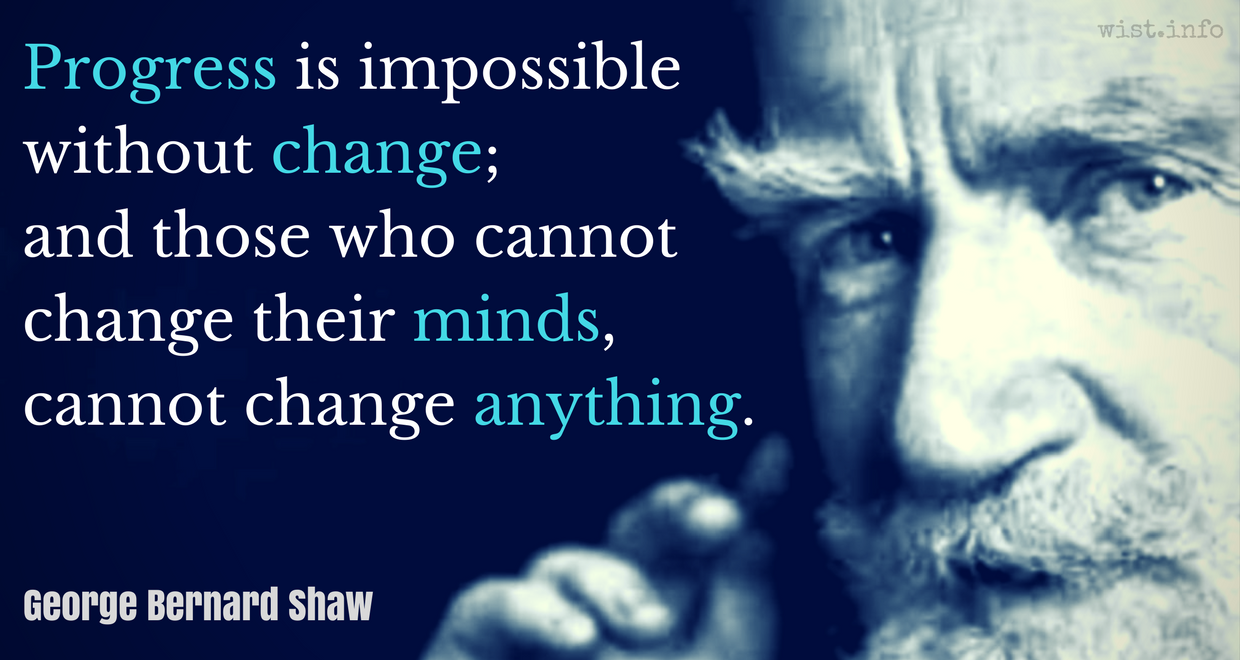It is particularly incumbent on those who never change their opinion, to be secure of judging properly at first.
Quotations about:
change of mind
Note not all quotations have been tagged, so Search may find additional quotes on this topic.
It is almost as difficult to make a man unlearn his errors as his knowledge. Mal-information is more hopeless than non-information; for error is always more busy than ignorance. Ignorance is a blank sheet, on which we may write; but error is a scribbled one, on which we must first erase. Ignorance is contented to stand still with her back to the truth; but error is more presumptuous, and proceeds in the same direction. Ignorance has no light, but error follows a false one. The consequence is, that error, when she retraces her footsteps, has further to go, before she can arrive at the truth, than ignorance.
Charles Caleb "C. C." Colton (1780-1832) English cleric, writer, aphorist
Lacon: Or, Many Things in Few Words, Vol. 1, § 1 (1820)
(Source)
As one who wills, and then unwills his will,
Changing his mind with every changing whim,
Till all his best intentions come to nil,
So I stood havering in that moorland dim,
While through fond rifts of fancy oozed away
The first quick zest that filled me to the brim.[E qual è quei che disvuol ciò che volle
e per novi pensier cangia proposta,
sì che dal cominciar tutto si tolle,
tal mi fec’ïo ’n quella oscura costa,
perché, pensando, consumai la ’mpresa
che fu nel cominciar cotanto tosta.]Dante Alighieri (1265-1321) Italian poet
The Divine Comedy [Divina Commedia], Book 1 “Inferno,” Canto 2, l. 37ff (2.37-42) (1309) [tr. Sayers (1949)]
(Source)
(Source (Italian)). Alternate translations:
As he who what he first resolv'd rejects,
And by some fresher reasons is induc'd
Wholly to lay aside his first intent;
So I, now in the mountain's shade arriv'd,
Refus'd th' attempt which I at first desir'd.
[tr. Rogers (1782), ll. 34-38]
Like one, who, some imagin'd peril near,
Feels his warm wishes chill'd by wint'ry fear,
And resolution sicken at the view,
Thus I perceiv'd my sinking spirits fail,
Thus trembling, I survey'd the gloomy vale,
As near the moment of decision drew.
[tr. Boyd (1802), st. 8]
As one, who unresolves
What he hath late resolv'd, and with new thoughts
Changes his purpose, from his first intent
Remov'd; e'en such was I on that dun coast,
Wasting in thought my enterprise, at first
So eagerly embrac'd.
[tr. Cary (1814)]
As one that what he wished unwisheth now,
And, changing purpose in a newer drift.
Doth his first motion wholly disallow;
So wrought I then beneath that gloomy cliff,
Who, meditating, quenched the venturous hope
That in her first beginning rose so swift.
[tr. Dayman (1843)]
And as one who unwills what he willed, and with new thoughts changes his purpose, so that he wholly quits the thing he commenced,
such I made myself on that dim coast: for with thinking I wasted the enterprise, that had been so quick in its commencement.
[tr. Carlyle (1849)]
Like one unwilling for the thing he wills,
Whose second thoughts have made his purpose pale,
And everything upon the threshold fail;
So did I with myself obscure that coast
With thinking much -- the enterprise gave o'er
With vehemence I had embraced before.
[tr. Bannerman (1850)]
And as with him unwishing what he wish'd,
Who changes purpose as new thoughts arise,
So that his first intentions pass away;
It was with me when on that coast obscure;
For as thought grew, the enterprise was lost,
Which at the first so quickly I desir'd.
[tr. Johnston (1867)]
And as he is, who unwills what he willed,
And by new thoughts doth his intention change,
So that from his design he quite withdraws,
Such I became, upon that dark hillside,
Because, in thinking, I consumed the emprise,
Which was so very prompt in the beginning.
[tr. Longfellow (1867)]
And as is he who ceases to will that he willed, and by reason of new thoughts changes purpose, so that he withdraws himself wholly from his beginning, so became I on that dark hillside; so that in my thought I made an end of the enterprise which in its commencement had been so hasty.
[tr. Butler (1885)]
Like unto one who wills not that he would,
And shifts his purpose with thought's changing tide,
So that he dare not make commencement good,
Thus acted I on that hill's darkened side;
In idle thought I wasted the emprise.
To which so swiftly I first had hied.
[tr. Minchin (1885)]
And as is he who unwills what he willed, and because of new thoughts changes his design, so that he quite withdraws from beginning, such I became on that dark hillside: wherefore in my thought I abandoned the enterprise which had been so hasty in the beginning.
[tr. Norton (1892)]
And as one who wisheth not that which he wished, and for new fancies changeth his resolve, so that he turns him wholly from his undertaking; even in such state was I on that dark slope; for, while I pondered, I brought to naught the enterprise, that was at first so readily embraced.
[tr. Sullivan (1893)]
And as one is who what he wished unwishes,
And for new thoughts exchanges his set purpose,
So that he quite departs from his beginnings,
Such I became upon that gloomy hillside;
Because in thought the enterprise I wasted
Which had at the beginning been so eager.
[tr. Griffith (1908)]
And as one who unwills what he willed and with new thoughts changes his purpose so that he quite withdraws from what he has begun, such I became on that dark slope; for by thinking of it I brought to naught the enterprise that was so hasty in its beginning.
[tr. Sinclair (1939)]
And like one who unwills what he willed first
And new thoughts change the intention that he had,
So that his resolution is reversed,
So on that dim slope did my purpose fade
For I with thinking had dulled down the zest
That at the outset sprang so prompt and glad.
[tr. Binyon (1943)]
As one who unwills what he wills, will stay
strong purposes with feeble second thoughts
until he spells all his first zeal away --
so I hung back and balked on that dim coast
till thinking had worn out my enterprise,
so stout at starting and so early lost.
[tr. Ciardi (1954)]
And like one who unwills what he has willed and with new thoughts changes his resolve, so that he quite gives up the thing he had begun, such did I become on that dark slope, for by thinking on it I rendered null the undertaking that had been so suddenly embarked upon.
[tr. Singleton (1970)]
As one who unwills what he willed, will change
his purposes with some new second thought,
completely quitting what he first had started,
so I did, standing there on that dark slope,
thinking, ending the beginning of that venture
I was so quick to take up at the start.
[tr. Musa (1971)]
And just as he who unwills what he wills
and shifts what he intends to seek new ends
so that he's drawn from what he had begun,
so was I in the midst of that dark land,
because, with all my thinking, I annulled
the task I had so quickly undertaken.
[tr. Mandelbaum (1980)]
And just like somebody who shilly-shallies,
And thinks again about what he has decided,
So that he gives up everything he has started,
I found I was on that obscure hillside:
By thinking about it I spoiled the undertaking
I had been so quick to enter in the first place.
[tr. Sisson (1981)]
And then, like one who unchooses his own choice
And thinking again undoes what he has started,
So I became: a nullifying unease
Overcame my soul on that dark slope and voided
The undertaking I had so quickly embraced.
[tr. Pinsky (1994), ll. 31-35]
And like one who unwills what he just now willed and with new thoughts changes his intent, so that he draws back entirely from beginning:
so did I become on that dark slope, for, thinking, I gave up the undertaking that I had been so quick to begin.
[tr. Durling (1996)]
And I rendered myself, on that dark shore, like one who un-wishes what he wished, and changes his purpose, in new thinking, so that he leaves off what he began, completely, since in thought I consumed action, that had been so ready to begin.
[tr. Kline (2002)]
As one who unwills what he willed,
and eyes another half-baked project,
so I bore away from my initial enterprise
and shilly-shallied on that twilit shore,
while dim thoughts flitted through my cranium
obscuring what I'd once been eager for.
[tr. Carson (2002)]
And so -- as though unwanting every want,
so altering all at every altering thought
now drawing back from everything begun --
I stood there on the darkened slope, fretting
away from thought to thought the bold intent
that seemed so very urgent at the outset.
[tr. Kirkpatrick (2006)]
And as one who unwills what he has willed,
changing his intent on second thought
so that he quite gives over what he has begun,
such a man was I on that dark slope.
With too much thinking I had undone
the enterprise so quick in its inception.
[tr. Hollander/Hollander (2007)]
Like someone half regretting what once seemed knowledge,
intention shifted around by fresh ideas,
Starting to throw all old ones overboard,
I stood on that dark slope, pulled by feelings
So murky they dissipated whatever I'd thought
I knew, surrendering what once seemed real.
[tr. Raffel (2010)]
Just so, obeying the unwritten rule
That one who would unsieh that which he wished,
Having thought twice about what he first sought,
Must put fish back into the pool he fished,
So they, set free, may once again be caught,
Just so did I in that now shadowy fold --
Because, by thinking, I'd consumed the thought
I started with, that I had thought so bold.
[tr. James (2013)]
Progress means getting nearer to the place where you want to be. And if you have taken a wrong turning, then to go forward does not get you any nearer. If you are on the wrong road, progress means doing an about-turn and walking back to the right road; and in that case, the man who turns back soonest is the most progressive.
C. S. Lewis (1898-1963) English writer, literary scholar, lay theologian [Clive Staples Lewis]
Mere Christianity, Book 1, ch. 5 “We Have Cause to be Uneasy” (1952)
(Source)
Originally broadcast on BBC Radio (27 Aug 1941) under the title "What Can We Do About It?" Reprinted first in Broadcast Talks (1943) (US title The Case for Christianity (1944)).
A man may be in as just possession of Truth as of a City, and yet be forced to surrender.
Thomas Browne (1605-1682) English physician and author
Religio Medici, Part 1, sec. 6 (1643)
(Source)
No,
it’s no disgrace for a man, even a wise man,
to learn many things and not to be too rigid.
You’ve seen trees by a raging winter torrent,
how many sway with the flood and salvage every twig,
but not the stubborn — they’re ripped out, roots and all.[ἀλλ᾽ ἄνδρα, κεἴ τις ᾖ σοφός, τὸ μανθάνειν
πόλλ᾽, αἰσχρὸν οὐδὲν καὶ τὸ μὴ τείνειν ἄγαν.
ὁρᾷς παρὰ ῥείθροισι χειμάρροις ὅσα
δένδρων ὑπείκει, κλῶνας ὡς ἐκσῴζεται,
τὰ δ᾽ ἀντιτείνοντ᾽ αὐτόπρεμν᾽ ἀπόλλυται.]Sophocles (496-406 BC) Greek tragic playwright
Antigone, l. 710ff [Haemon] (441 BC) [tr. Fagles (1982), l. 794ff]
(Source)
Ancient Greek. Alternate translations:
But that a man, how wise soe'er, should learn
In many things and slack his stubborn will,
This is no derogation. When the streams
Are swollen by mountain-torrents, thou hast seen
That all the trees wich bend them to the flood
Preserve their branches from the angry current,
While those which stem it perish root and branch.
[tr. Donaldson (1848)]
The wisest man will let himself be swayed
By others' wisdom and relax in time.
See how the trees beside a stream in flood
Save, if they yield to force, each spray unharmed,
But by resisting perish root and branch.
[tr. Campbell (1873)]
'Tis no disgrace even to the wise to learn
And lend an ear to reason. You may see
The plant that yields where torrent waters flow
Saves every little twig, when the stout tree
Is torn away and dies.
[tr. Storr (1859)]
No, even when a man is wise, it brings him no shame to learn many things, and not to be too rigid. You see how the trees that stand beside the torrential streams created by a winter storm yield to it and save their branches, while the stiff and rigid perish root and all?
[tr. Jebb (1891)]
True wisdom will be ever glad to learn,
And not too fond of power. Observe the trees,
That bend to wintry torrents, how their boughs
Unhurt remain; while those that brave the storm,
Uprooted torn, shall wither and decay.
[tr. Werner (1892)]
No, though a man be wise, 'tis no shame for him to learn many things, and to bend in season. Seest thou, beside the wintry torrent's course, how the trees that yield to it save every twig, while the stiff-necked perish root and branch?
[tr. Jebb (1917)]
It is not reason never to yield to reason!
In flood time you can see how some trees bend,
And because they bend, even their twigs are safe,
While stubborn trees are torn up, roots and all
[tr. Fitts/Fitzgerald (1939), l. 570ff]
It is no weakness for the wisest man
To learn when he is wrong, know when to yield.
So, on the margin of a flooded river
Trees bending to the torrent live unbroken,
While those that strain against it are snapped off.
[tr. Watling (1947), l. 608ff]
A man, though wise, should never be ashamed
of learning more, and must unbend his mind.
Have you not seen the trees beside the torrent,
the ones that bend them saving every leaf,
while the resistant perish root and branch?
[tr. Wyckoff (1954)]
There's no disgrace, even if one is wise,
In learning more, and knowing when to yield.
See how the trees that grow beside a torrent
Preserve their branches, if they bend; the others,
Those that resist, are torn out, root and branch.
[tr. Kitto (1962)]
But a wise man can learn a lot and never be ashamed;
He knows he does not have to be rigid and close-hauled.
You've seen trees tossed by a torrent in a flash flood:
If they bend, they're saved, and every twig survives,
But if they stiffen up, they're washed out from the roots.
[tr. Woodruff (2001)]
But for a man, even if he is wise, to go on learning
many things and not to be drawn too taut is no shame.
You see how along streams swollen from winter floods
some trees yield and save their twigs,
but others resist and perish, root and branch.
[tr. Tyrell/Bennett (2002)]
On the contrary, it is no shame for even a wise man to continue learning. Nor should a man be obstinate. One can see the trees on the heavy river-banks. Those that bend with the rushing current, survive, whereas those bent against it are torn, roots and all.
[tr. Theodoridis (2004)]
For any man,
even if he’s wise, there’s nothing shameful
in learning many things, staying flexible.
You notice how in winter floods the trees
which bend before the storm preserve their twigs.
The ones who stand against it are destroyed,
root and branch.
[tr. Johnston (2005), l. 804ff]
No, it's no disgrace for a man, even a wise man, to learn many things and not to be too rigid. You see how, in the winter storms, the trees yield that save even their twigs, but those who oppose it are destroyed root and branch.
[tr. Thomas (2005)]
We sometimes find ourselves changing our minds without any resistance or heavy emotion, but if we are told that we are wrong we resent the imputation and harden our hearts. We are incredibly heedless in the formation of our beliefs, but find ourselves filled with an illicit passion for them when anyone proposes to rob us of their companionship. It is obviously not the ideas themselves that are dear to us, but our self-esteem which is threatened.
James Harvey Robinson (1863-1936) American historian and educator
The Mind in the Making, ch. 4 “Rationalizing” (1921)
(Source)
Progress is impossible without change; and those who cannot change their minds, cannot change anything.
George Bernard Shaw (1856-1950) British playwright and critic
Everybody’s Political What’s What? (1950 ed.)
(Source)
No well-informed person has declared a change of opinion to be inconstancy.
[Nemo doctus unquam mutationem consilii inconstantiam dixit esse.]
Marcus Tullius Cicero (106-43 BC) Roman orator, statesman, philosopher
Epistulae ad Atticum [Letters to Atticus], Book 16, Letter 7 (16.7) (59-54 BC)
Alt. trans.: No philosopher ever yet -- and there has been a great deal written upon the subject -- defined a mere change of plan as vacillation. [Nemo doctus umquam (multa autem de hoc genere scripta sunt) mutationem consili inconstantiam dixit esse.]
Often mis-cited as Letter 8.
The Vicar of Blackstable would have nothing to do with the scheme which Philip laid before him. He had a great idea that one should stick to whatever one had begun. Like all weak men he laid an exaggerated stress on not changing one’s mind.
W. Somerset Maugham (1874-1965) English novelist and playwright [William Somerset Maugham]
Of Human Bondage, ch. 39 (1915)
(Source)
Men run out of one superstition into an opposite superstition.
Ralph Waldo Emerson (1803-1882) American essayist, lecturer, poet
“The Scholar,” lecture, University of Virginia (1876-06-28)
(Source)
The difficulty lies, not in the new ideas, but in escaping from the old ones, which ramify, for those brought up as most of us have been, into every corner of our minds.
John Maynard Keynes (1883-1946) English economist
The General Theory of Employment, Interest and Money, Preface (1936)
(Source)
When my information changes, I alter my conclusions. What do you do, sir?
John Maynard Keynes (1883-1946) English economist
(Attributed)
Reply to a criticism of having changed his position on monetary policy. Quoted in Paul Samuelson, "The Keynes Centenary" The Economist, Vol. 287 (1983), but possibly apocryphal (see here).
Variants:
- "When events change, I change my mind. What do you do?"
- "When the facts change, I change my mind. What do you do, sir?"
- "When someone persuades me that I am wrong, I change my mind. What do you do?"
Don’t commit suicide, because you might change your mind two weeks later.
Art Buchwald (1925-2007) American humorist, columnist
Leaving Home (1995)
A personal mantra Buchwald used to combat his intermittent depression. Possibly borrowed from Voltaire.
The latter part of a wise man’s life is taken up in curing the follies, prejudices, and false opinions he had contracted in the former.
Jonathan Swift (1667-1745) English writer and churchman
“Thoughts on Various Subjects” (1706)
(Source)
A man who never alters his opinion is like standing water, and breeds reptiles of the mind.
William Blake (1757-1827) English poet, mystic, artist
The Marriage of Heaven and Hell, “A Memorable Fancy” (1790)
(Source)
For the wicked are full of regrets.
[μεταμελείας γὰρ οἱ φαῦλοι γέμουσιν.]
Aristotle (384-322 BC) Greek philosopher
Nicomachean Ethics [Ἠθικὰ Νικομάχεια], Book 9, ch. 4 (9.4.10) / 1166b.24-25 (c. 325 BC) [tr. Welldon (1892)]
(Source)
(Source (Greek)). Alternate translations:
For the wicked are full of remorse.
[tr. Chase (1847)]
Whence it is that the wicked are ever full of repentance.
[tr. Williams (1869)]
For those who are not good are full of remorse.
[tr. Peters (1893)]
For bad men are laden with repentance.
[tr. Ross (1908)]
The bad are always changing their minds.
[tr. Rackham (1934)]
For base people are full of regret.
[tr. Reeve (1948)]
For bad men are full of regrets.
[tr. Apostle (1975)]
For bad men are full of regrets.
[tr. Thomson/Tredennick (1976)]
For base people are full of regret.
[tr. Irwin/Fine (1995)]
For bad people are full of regrets.
[tr. Crisp (2000)]
For base people teem with regret.
[tr. Bartlett/Collins (2011)]
It is never to be expected in a revolution that every man is to change his opinion at the same moment. There never yet was any truth or any principle so irresistibly obvious that all men believed it at once.
Thomas Paine (1737-1809) American political philosopher and writer
“Dissertation on the First Principles of Government” (Jul 1795)
Source essay
This imputation of inconsistency is one to which every sound politician and every honest thinker must sooner or later subject himself. The foolish and the dead alone never change their opinions.
James Russell Lowell (1819-1891) American diplomat, essayist, poet
“Abraham Lincoln” (1864), My Study Windows (1871)
(Source)
If in the last few years you haven’t discarded a major opinion or acquired a new one, check your pulse. You may be dead.
Gelett Burgess (1866-1951) American humorist and illustrator
(Attributed)
Common paraphrase. In Look Eleven Years Younger (1937), Burgess gives two versions of the quotation:See for more discussion.
- "When you find you haven’t discarded a major opinion for years, or acquired a new one, you should stop and investigate to see if you’re not growing senile."
- "If in the last few years you haven’t discarded a major opinion or acquired a new one investigate and see if you’re not growing senile."
Those who never retract their opinions love themselves more than they love truth.
[Ceux qui ne se rétractent jamais s’aiment phis que la vérité.]
Joseph Joubert (1754-1824) French moralist, philosopher, essayist, poet
Pensées [Thoughts], ch. 11 “De la Vérité, de l’Illusion et de l’Erreur [Of Truth, Illusion, and Error],” ¶ 57 (1850 ed.) [tr. Attwell (1896), ¶ 161]
(Source)
(Source (French)). Alternate translations:
They who never retract, love themselves more than truth.
[tr. Calvert (1866), ch. 10]
Those who never retract love themselves better than truth.
[tr. Lyttelton (1899), ch. 10, ¶ 29]
Men who never take back their words love themselves more than truth.
[tr. Collins (1928), ch. 10]
Those who never back down love themselves more than they love the truth.
[tr. Auster (1983)], 1806]
Perhaps the sentiments contained in the following pages, are not YET sufficiently fashionable to procure them general favour; a long habit of not thinking a thing WRONG, gives it a superficial appearance of being RIGHT, and raises at first a formidable outcry in defense of custom. But the tumult soon subsides. Time makes more converts than reason.
Thomas Paine (1737-1809) American political philosopher and writer
Common Sense (14 Feb 1776)
Source essay
With consistency a great soul has simply nothing to do. He may as well concern himself with his shadow on the wall. Speak what you think to-day in words as hard as cannon-balls and to-morrow speak what to-morrow thinks in hard words again, though it contradict every thing you said to-day.
Faced with the choice between changing one’s mind and proving there is no need to do so, almost everyone gets busy on the proof.
John Kenneth Galbraith (1908-2006) Canadian-American economist, diplomat, author
Economics, Peace and Laughter (1971)
(Source)
(also called "Galbraith's Law")




























